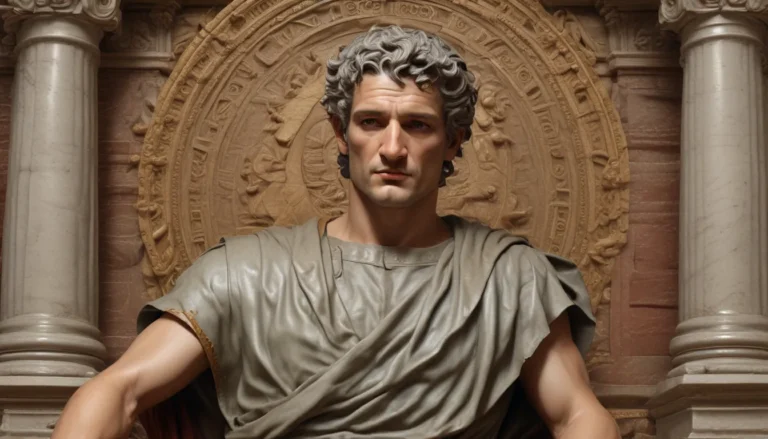The images in our articles may not match the content exactly. They are used to grab your attention, not to show the exact details in the text. The images complement the text but do not replace it.
Ralph Waldo Emerson, a prominent figure in American history, left a lasting legacy in the realms of literature and transcendentalism. His profound impact on personal growth and social reform continues to resonate with individuals seeking inspiration and intellectual growth. Let’s delve into 16 fascinating facts about Emerson, shedding light on his life, writings, and enduring influence.
The Early Life and Education of Emerson
Ralph Waldo Emerson was born on May 25, 1803, in Boston, Massachusetts, to a family of ministers. His early exposure to intellectual and spiritual ideas laid the foundation for his journey towards becoming a revered essayist, poet, and lecturer. Emerson attended Harvard College at the age of 14, showcasing his academic prowess and passion for learning.
The Birth of Transcendentalism and Emerson’s Connection to Nature
In the 1830s, Emerson emerged as a leading figure in the transcendentalist movement, emphasizing individualism, intuition, and imagination. His essay “Nature,” published in 1836, explores the profound connection between humans and the natural world. Emerson’s advocacy for a deeper relationship with nature inspired readers to seek spiritual growth and a greater understanding of the world around them.
Emerson’s Impact on American Literature and Philosophy
Emerson’s writings had a profound impact on American literature, encouraging writers to express their individuality and introspect on the mysteries of the human experience. His friendship with fellow transcendentalist Henry David Thoreau further enriched his philosophical ideas, shaping the cultural movements of their time.
The Theme of Self-Reliance in Emerson’s Works
Central to Emerson’s philosophy was the theme of self-reliance. He believed in the power of individual thought and action, urging people to trust their instincts and live authentically. Emerson’s call for self-reliance continues to resonate with individuals seeking personal growth and empowerment.
Emerson as a Lecturer and Social Reformer
Emerson’s captivating lectures on philosophy, literature, and spirituality attracted large audiences and established him as a prominent public speaker. He used his platform to advocate for social reform and abolitionism, speaking out against injustice and inequality in society. Emerson’s commitment to equality and respect for all individuals remains a cornerstone of his enduring legacy.
Emerson’s Friendship with Henry David Thoreau and Mentorship Role
Emerson’s close friendship with Henry David Thoreau, who lived on Emerson’s property at Walden Pond, influenced both of their works. Thoreau’s experience at Walden Pond inspired his famous book, “Walden,” highlighting the importance of nature and self-reflection. Additionally, Emerson served as a mentor to aspiring writers and intellectuals, nurturing their talents and inspiring them to explore new ideas and perspectives.
Emerson’s Personal Life and Legacy
Emerson’s personal life, marked by marriages, family life, and personal tragedies, reflected his commitment to simplicity and authenticity. Despite facing personal challenges, Emerson continued to write and inspire others until his passing in 1882. His legacy as a writer, thinker, and leader lives on, inspiring individuals to seek personal growth, self-expression, and a deeper connection to the world.
Emerson’s Quotes and the Impact of His Works
Emerson’s profound and insightful quotes continue to inspire generations, offering wisdom and guidance in navigating the complexities of life. His works have influenced generations of thinkers, writers, and leaders, shaping American literature, philosophy, and cultural movements. The enduring influence of Emerson’s ideas underscores the timeless quality of his writings and their relevance to contemporary audiences.
Exploring Emerson’s Enduring Influence and How to Apply His Ideas to Your Life
Emerson’s ideas and philosophy continue to resonate with individuals seeking personal growth, self-expression, and a deeper connection to the world. By embracing self-reliance, spending time in nature, and nurturing your individuality, you can align yourself with Emerson’s philosophy and live a more fulfilling and authentic life. Delve into Emerson’s life and works to gain valuable insights and inspiration for your personal journey of self-discovery and intellectual growth.
Conclusion: Embracing the Legacy of Ralph Waldo Emerson
Ralph Waldo Emerson’s life and works continue to inspire and captivate people around the world. His enduring influence on American literature, philosophy, and social reform reinforces the timeless nature of his ideas and their relevance to contemporary audiences. Whether you are a literature enthusiast or simply curious about the profound impact of Emerson’s writings, exploring his life and works can provide valuable insights and inspiration. Let Emerson’s words guide you on a path of self-discovery, personal growth, and intellectual exploration.
FAQs: Answering Common Questions About Emerson and His Works
-
Who was Ralph Waldo Emerson?
Ralph Waldo Emerson was an American essayist, philosopher, and poet known for his contributions to the transcendentalist movement of the 19th century. His thought-provoking writings and lectures on individualism, nature, and self-reliance continue to inspire readers seeking personal growth and intellectual insight. -
What are some of Emerson’s notable works?
Emerson’s well-known works include “Nature,” “Self-Reliance,” “The American Scholar,” and “Experience.” These essays explore themes such as the relationship between humans and nature, the power of individual thought, and the pursuit of personal growth and self-expression. -
How did Emerson’s ideas contribute to American literature?
Emerson’s ideas challenged traditional religious and societal norms, advocating for individual freedom and expression. His works laid the foundation for American Transcendentalism and influenced writers such as Henry David Thoreau and Walt Whitman, shaping the landscape of American literature. -
What is the concept of self-reliance that Emerson advocated?
Emerson believed in the power of individualism and encouraged people to trust their instincts and beliefs. He emphasized the importance of self-reliance as a means of personal growth and spiritual development, urging individuals to think independently and live authentically. -
How can I apply Emerson’s ideas to my own life?
You can apply Emerson’s ideas by embracing self-reliance, spending time in nature, and cultivating your own thoughts and beliefs. By nurturing your individuality and seeking personal growth, you can align yourself with Emerson’s philosophy and live a more fulfilling and authentic life.
In conclusion, Ralph Waldo Emerson’s legacy as a writer, thinker, and leader continues to inspire individuals seeking personal growth, self-expression, and a deeper connection to the world. His profound insights and timeless wisdom offer valuable guidance for navigating the complexities of life and embracing the journey of self-discovery. Explore the world of Emerson, immerse yourself in his works, and let his words ignite a spark of inspiration within you.






